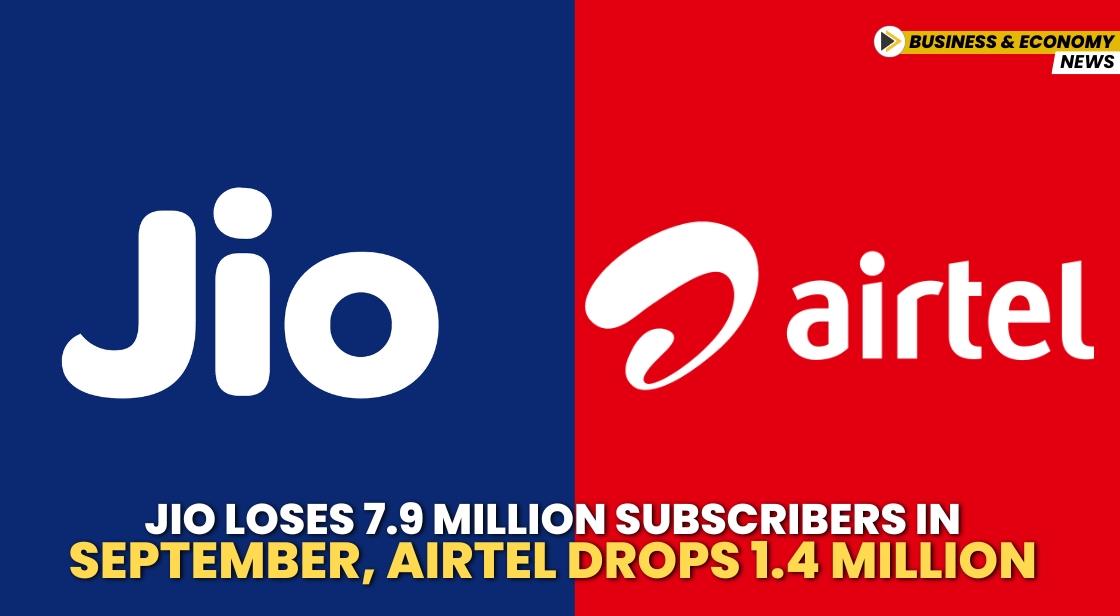Jio Loses 7.9 Million Subscribers in September, Airtel Drops 1.4 Million

News Synopsis
Telecom giants Reliance Jio and Bharti Airtel continued to experience subscriber losses in September 2024, primarily as a result of tariff hikes introduced in July. Both companies have now seen subscriber declines for the third consecutive month. Jio recorded the most significant loss, shedding 79 lakh wireless subscribers in September, while Airtel followed with a loss of 14 lakh subscribers. These losses reflect the ongoing challenges faced by operators as price increases impact user retention.
Vodafone Idea and MTNL Subscriber Losses
Vodafone Idea (Vi) also suffered subscriber losses during this period, with the company losing 15 lakh subscribers. Meanwhile, MTNL, the government-owned telecom operator, saw a slight dip, losing 2,100 subscribers. Despite these declines, the telecom market as a whole has shown some noteworthy patterns, including regional shifts and competition in subscriber growth.
BSNL’s Growth Amidst Subscriber Losses
While major private operators struggled, BSNL (Bharat Sanchar Nigam Limited) emerged as the only telecom operator to gain subscribers in September 2024. BSNL added 8.49 lakh new subscribers during the month, showcasing resilience in a challenging market environment. This growth indicates that state-owned operators are still able to attract users despite the overall industry trend of subscriber losses.
Decline in the Indian Telecom Market
The overall Indian telecom sector recorded a significant decline in subscribers, with a net loss of 1 crore wireless subscribers in September. This resulted in a 0.87% drop in the total active wireless user base, which fell from 116 crore in August to 115 crore in September. The drop in active users is a direct consequence of the tariff hikes and market conditions that have led to greater churn among subscribers.
Market Share Distribution Among Telecom Operators
Despite the losses, Reliance Jio retained its dominant position in the Indian telecom market, holding a 40.20% market share. Bharti Airtel followed closely with a 33.24% share, while Vodafone Idea (Vi) held an 18.41% market share. BSNL’s market share stood at 7.98%, highlighting the ongoing competition between private and state-owned operators.
Tele-density Declines in India
India’s teledensity also saw a decline in September 2024, falling to 84.69% from 85.43% in the previous month. This drop reflects the broader trend of decreasing telecom penetration, particularly in rural and semi-urban regions, where price hikes and competition for subscribers have taken a toll on the market.
Broadband Market Trends
In the broadband segment, which includes both wireless and wireline services, India’s total broadband user base declined by 0.51%, from 94.9 crore in August to 94.4 crore in September. Reliance Jio continued to lead in the broadband market, commanding a 50.61% share, followed by Airtel with 30.20% and Vodafone Idea (Vi) with 13.38%. This shift in broadband usage patterns signals continued competition and the challenge of attracting new customers in an increasingly saturated market.
Surge in Mobile Number Portability (MNP) Requests
September 2024 also saw a significant increase in Mobile Number Portability (MNP) requests. Over 1.33 crore subscribers submitted applications to switch networks, indicating growing dissatisfaction among consumers with their current service providers. This rise in MNP applications highlights the increasing price sensitivity of users and their willingness to explore alternative networks that may offer better value.
Reasons Behind Subscriber Losses
The subscriber losses reported by telecom operators can largely be attributed to the tariff hikes implemented earlier in the year. In July, Airtel raised the prices of its prepaid plans by up to 25%, while Jio also increased tariffs for both its prepaid and postpaid plans by 12% to 25%. These price hikes have had a noticeable impact on user retention, with many consumers opting to reduce their mobile usage or switch to lower-cost alternatives.
Future Prospects: Telecom Operators Eye Satellite Communications
In response to the challenges in the telecom sector, both Airtel and Jio are shifting their focus toward new frontiers, including satellite communication (satcom) services. In October 2024, the Department of Telecommunications (DoT) provisionally allocated satellite spectrum to Airtel-backed OneWeb and Jio’s Orbit Connect India for test runs. Both companies have announced plans to integrate satcom services with their existing telecom operations, aiming to expand their offerings and tap into underserved rural markets.
Conclusion: Challenges and Opportunities for Telecom Operators
The subscriber losses faced by Jio, Airtel, and other telecom operators are a reminder of the ongoing pressures in the Indian telecom market. However, with new innovations in satellite communications and a strong push to enhance rural connectivity, the future could bring new growth opportunities for the industry. The success of these ventures will largely depend on how operators balance the need for affordable services with their strategies for expanding their customer base and market share.
You May Like









